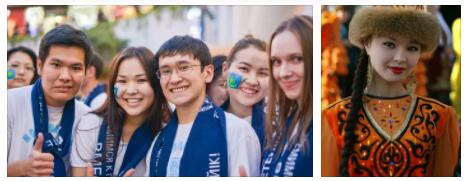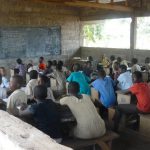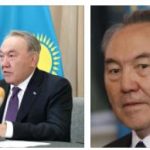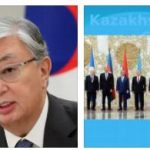In today’s Kazakhstan, the Kazakh language and culture is gradually gaining ground again, but Russian is still of great importance. The many nationalities live together peacefully. There are great differences between social classes, generations, city and country, north and south.
Share alphabet. Adults: 99.8%
Major religions: sunni. Islam (70%); Russian Orthodox (26%)
Urban population: 58.2% (2019)
Life expectancy (male / female): 66.2 / 76.3 years, (2018, estimated)
Gender Inequality Index: 58 (of 189), 2018
Number of births: 2.2 / woman, (2018, estimated)
Infant mortality: 19 / 1,000 live births, (2018, estimated)
Both the HDI and the physical appearance show that at least part of the (oil) wealth has reached the population. A middle class has established itself in the big cities, but events like the real estate crisis in 2008 have already shown how quickly livelihoods are threatened. The widespread legal uncertainty does the rest. Above all, the gap between a very rich elite, which is also making a name for itself internationally, and the normal population is diverging more and more. The differences between villages, various provincial cities and the two capitals are also growing. And, of all things, the west is rich in oil. The social situation in Kazakhstan is particularly tense. Real wages have been falling for several years. For a long time, however, both dissatisfaction with their own social situation and with the reforms planned by the government only had an activating effect on very few people. At the beginning of February 2014, the approval of the Tenge course, which ultimately led to a currency devaluation of 19%, provoked protests – and crackdown by the security forces. The economic crisis and the associated devaluation of the Tenge aggravated the socio-economic situation of large parts of the population. Real incomes have been falling since 2014 (by 3.4% in the first half of 2017). At first only desperate mortgage debtors carried their protest on the street, but the demonstrations against the project of a new land law in spring 2016 – the largest in independent Kazakhstan to date – can be interpreted as a sign that the patience of many Kazakhstanians is not infinite. At the beginning of 2019, the horror over the death by fire of five children who were left at home unattended at night while their parents who were employed in the low-wage sector had to work, symbolized growing social problems and the occasion for various rallies that prompted the government to implement a package of social improvements – that however, did not satisfy those affected.
The proportion of the poor according to the international definition seems small at less than 2%, but survival in such expensive cities as Almaty and Nur-Sultan requires far more than 2 US dollars a day. Often retirees are particularly hard hit, as are the unemployed and rural immigrants. A large group of private borrowers is also repeatedly in a hopeless situation. In June 2013, after controversial discussions, a reform of the pension system was decided, the main innovations of which are the raising of the retirement age for women from 58 to 63 years and the introduction of a number of pension funds. The management of the fund is not without controversy. In times of economic crisis, however, are practically forcing older people to give up their jobs. The average pension is said to have been around US $ 183 a month in 2018. (The average monthly income in 2018 was around 440 US dollars, with the differences between the industries and locations being very large. The minimum income was increased by 50% to 111 US dollars on 1/1/2019.) The unemployment rate has been official for years Almost unchanged at around 5%, unofficial figures give more than 10%. There are no trade unions as independent representatives of the interests of the workers, “free” trade unions are not tolerated by the state, the official unions are considered state-controlled. Against the new workers’ rights deteriorating labor law, there was no audible opposition, even though human rights, the situation of the workers expressed a negative rate. But in the oil-rich west of the country there are more and more government- criminalized strikes, which in vain demand independent interest groups. At the oil production sites, the very different pay for foreign skilled workers and Kazakhstani staff is also a constant conflict.
The situation of immigrants is also precarious, both the Kazakh people who come from the countryside to the cities in search of work and better living conditions and who encounter housing problems there and earn little money with unskilled jobs, as well as the migrant workers from neighboring Central Asian countries Republics whose status and social situation are still problematic despite legal improvements. Workers from the PRC, on the other hand, are less socially disadvantaged than exposed to the sinophobic mood in the country.
Despite some improvements is also the situation of people, especially children, with restrictions still difficult.
Development and development policy
Even if the conditions in remote Kazakh villages hardly differ from those in neighboring countries, the economic and social data of the country as well as the actual living conditions of the majority of the population clearly show that Kazakhstan only relies to a limited extent on the support of the international community. The final result of the Millennium Development Goals also expresses this. The country is no longer just recipients of international aid, but even has its own agency for Entwicklungszusammenabeit. Projects for the further development of Kazakhstan are financed from the national welfare fund Samruk-Kazyna, which, however, has been criticized more often. USAID, UNDP, ADB, World Bank and others are active in a wide variety of areas in Kazakhstan.
German engagement
According to ezinereligion, Kazakhstan has not been a partner country for bilateral development cooperation since April 2008. Accordingly, it is only integrated into German development cooperation through a few regional projects, for example GIZ or KfW. However, there are German experts sent to Kazakhstan by the Center for International Migration and Development (CIM) and the Senior Expert Service, and there are always projects from other development cooperation organizations.
The Goethe-Institut, DAAD and Friedrich-Ebert-Stiftung, Konrad-Adenauer-Stiftung and, since autumn 2019, the Rosa-Luxemburg-Stiftung have their own branches in Almaty and / or Nur-Sultan.









